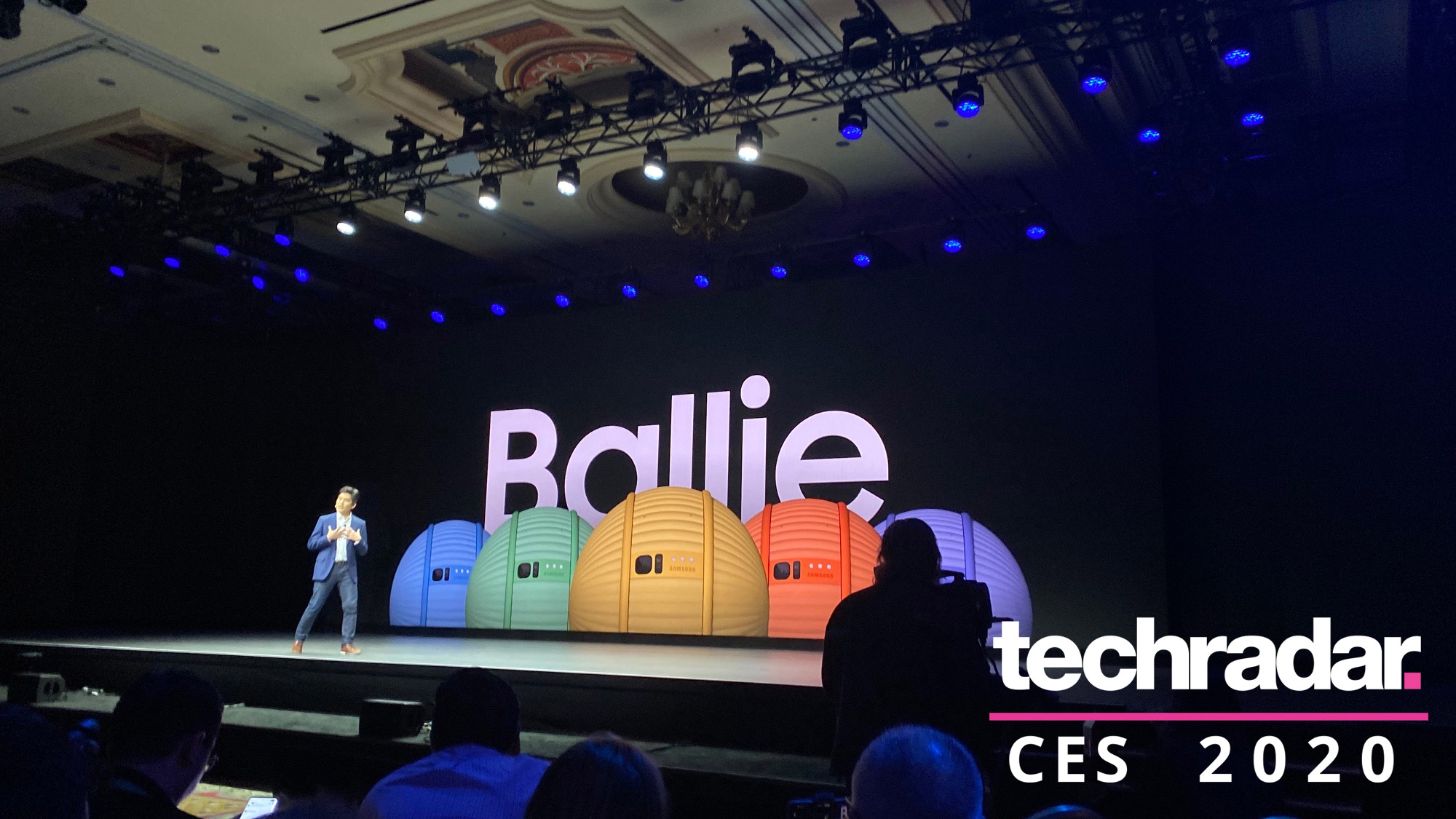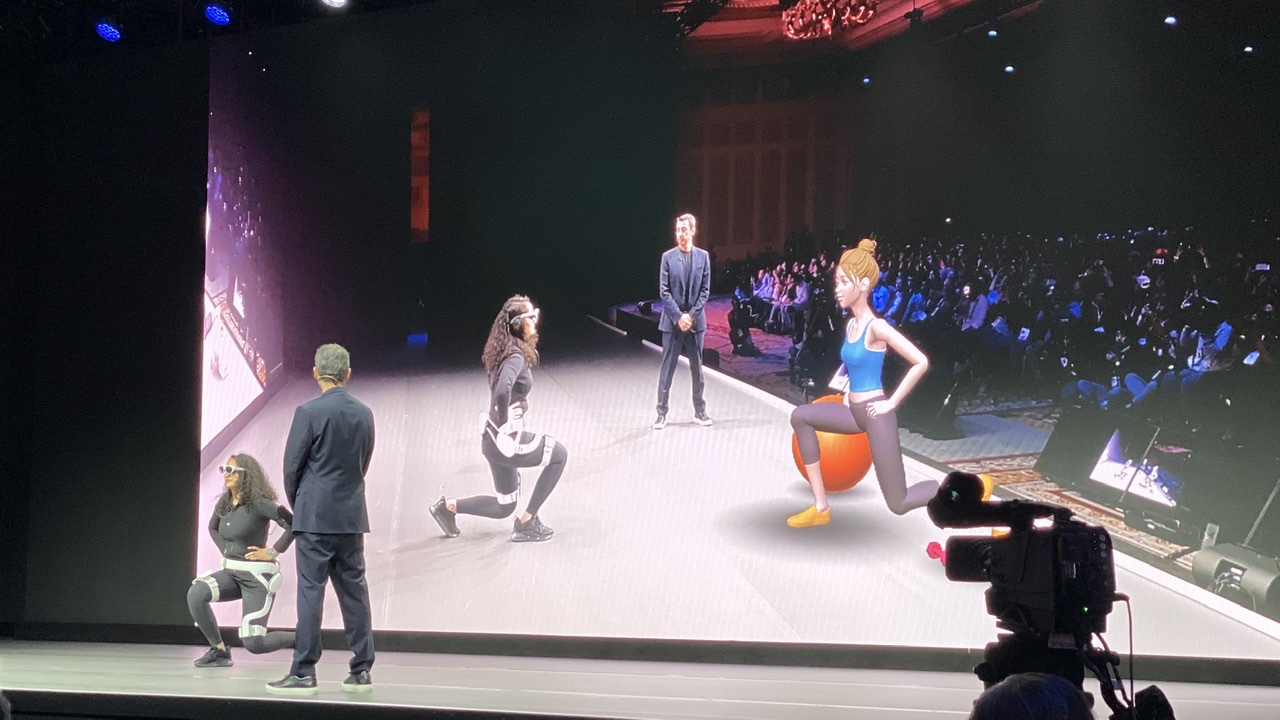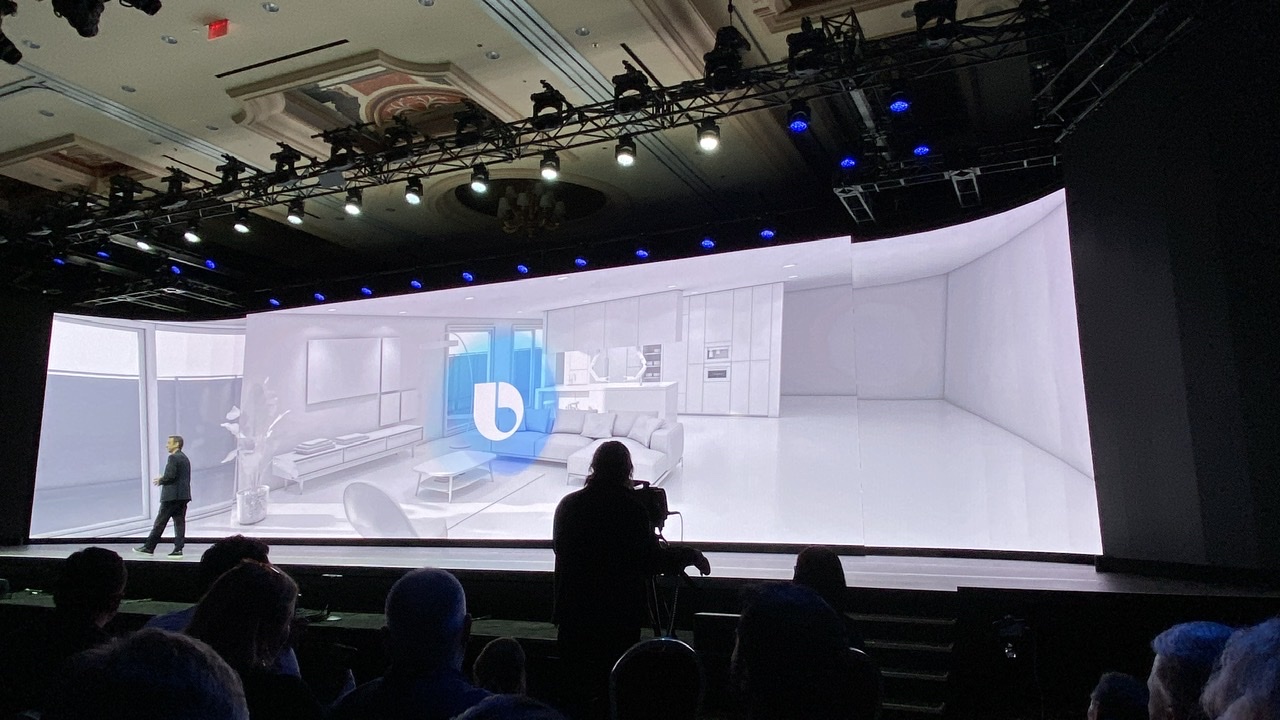Samsung's CES keynote highlight? A robot ball that follows you around the house

Samsung's CES 2020 keynote was odd - it wasn't about product at all. The future of the smart home, the smart city, the smart car... that was all covered, but nothing about TVs, phones or things we're used to seeing.
It felt like more of a mission statement - and the only thing that we saw that was close to a product (apart from some dangling robot cutting arms in the 'smart kitchen of the future') was a ball that rolled behind you around the home. Called Ballie.
Samsung clearly isn't launching this product, as there was no price, release date or spec list.
There was a demo where HS Kim, Samsung's CEO of consumer tech in North America, ran around on the stage being chased by a little yellow ball, as Samsung showed its plans for the next wave of our interconnected lives.
In fact, it's always going to be a comedy moment when a high-powered member of the Samsung executive board is trying to run faster from a large tennis ball, trying to make it give him more attention.

In theory, Ballie is creepy as anything. He's got a camera that can recognise you (to capture 'special family moments'... so he's always watching), voice recognition so you can tell him things, and a desire to be a dog's best firend, alerting the robot vacuum if your pooch makes a mess and tidying it up, before you get home.
He can roll up and tell you when it's time to exercise because you're being lazy on the sofa... because who doesn't want a small robot ball berating them for their lack of energy?
Sign up for breaking news, reviews, opinion, top tech deals, and more.
In fact, if it weren't for the cute whistles, it would be a super creepy robot. If the green light on its front was red, it would be downright scary.
The other, mildly, interesting 'product' was the improvement to Samsung's GEMS (Gait Enhancement and Mobility System) except... we're not sure it was an improvement. Because nobody can really remember what launched last year.
The system is a bottom-half exoskeleton, AR glasses and a watch, where all together can help you get fitter. The wearer enters the other reality through the glasses, where a giant personal trainer will castigate you for your lunging capability, or tell you that she's secretly upped the intensity of the workout.

It's cool that you can talk to the AR trainer directly, but again - with no price, release date or specs, it's hard to say that this is anything more than a vague nod to a direction Samsung is taking.
Beyond those two 'products'... Samsung's keynote mission statement was clearly about setting its stall out for the next 10 years. The message it kept returning to was that it cared about privacy. That it would do its artificial intelligence things on the phone, rather than in the cloud.
That Ballie wasn't going to spy on you... honestly. The thing is, there was no reason to believe this privacy pledge beyond the fact that Knox, Samsung's security software, is no longer going to just be on the phone but will spread to the TV or appliances too, in order to protect all your connected life.
It's great that a brand as massive and broad as Samsung wants people to trust that it's not playing with data - but without more detail, it's quite an airy statement.
Let's hear more about Knox, or the on-device safety barriers that it's putting in. Let's hear how you're more safe than Apple, than most of the other brands. Otherwise, it's as vague as talking about smart cities or something.
How smart can a city be?
Oh, another thing Samsung talked about is the smart city. You know, that place that lives in the future and people are carried around in electric vehicles and respect Mother, their Overlord and really enjoy a silver jumpsuit.
Smart Cities. A phrase that sends a shiver down the spine of any tech journalist.January 7, 2020
We're not really sure what Samsung's plans are in terms of making our cities smart, but it announced a partnership with Greystar, the developer, to bring some of the elements of the buildings it has in Seoul to the wider world.
That means - in theory - that you'll be able to use your voice to track your packages, find a parking space or turn off your lights - all working togther in harmony. It seems like this partnership with Greystar will enable this, but again... details weren't forthcoming.
The smart city extends out to the car, where 5G is set to change things through being able to map the city around you and text your boss when you're going to be late to a meeting - or enable you to hop on a scooter or the subway for a fixed charge through your phone.

At home, your kitchen will work in harmony with Samsung Health to know what you should eat depending on your exercise levels - and some crazy robot arms with knife claws will prepare food for you.
In short, Samsung's keynote speech was more like one of those press conferences you see in a futuristic film, where the rich CEO unveils some new tech that speaks about new technology to enchant our future.
Even the cadence and tone of the voices of the speakers was oddly melodic and soft as the brand sought to make every futuristic pledge seem magical.
This might sound like a criticism of Samsung's keynote - and it's really not. If the future it's talking about comes to life, we'll be more mobile, more healthy, more connected and living far more efficient lives.
But we don't have anything concrete to base that on. No release dates, no prices, and nothing that explains how this future is going to start happening in the next year.
The only thing we saw that was real was a small ball following a CEO around a stage... and we can't even buy it.
- Check out all of TechRadar's CES 2020 coverage. We're live in Las Vegas to bring you all the breaking tech news and launches, plus hands-on reviews of everything from 8K TVs and foldable displays to new phones, laptops and smart home gadgets.

Gareth has been part of the consumer technology world in a career spanning three decades. He started life as a staff writer on the fledgling TechRadar, and has grew with the site (primarily as phones, tablets and wearables editor) until becoming Global Editor in Chief in 2018. Gareth has written over 4,000 articles for TechRadar, has contributed expert insight to a number of other publications, chaired panels on zeitgeist technologies, presented at the Gadget Show Live as well as representing the brand on TV and radio for multiple channels including Sky, BBC, ITV and Al-Jazeera. Passionate about fitness, he can bore anyone rigid about stress management, sleep tracking, heart rate variance as well as bemoaning something about the latest iPhone, Galaxy or OLED TV.